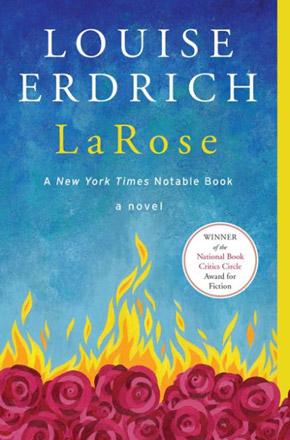An unspeakable gift

Sally Bland, The Jordan Times
Louise Erdrich
New York, HarperCollins Publishers, 2016, Pp. 372
In her fifteenth novel, Louise Erdrich combines myth, hard-boiled reality and her own family history to tell an intense, emotionally charged story. The narrative unfolds on the cusp of a set of opposites which seem headed towards collision, but just as often meld together in unexpected ways. Set in North Dakota, on the boundary line between an Ojibwe reservation and the adjacent town of Pluto, “LaRose” is peopled by Native Americans and Americans of European descent, and many of mixed blood.
Sometimes the two communities seem at odds, at other times they coalesce. Still, none of the characters are mere symbols for their community. One learns a lot about the history and contemporary reality of the Ojibwes from their actions and memories, but each one is very individual and unpredictable. Erdrich obviously prefers characters who refuse to be defined by convention.
The most obvious opposite is between Native American culture as opposed to the “American way of life”. With the story weaving back and forth in time, this conflict is traced from the early days of outright extermination campaigns and land-grabs against Native Americans, to the era of forced assimilation of Indian youth in boarding schools, and up to the second millennium, by which time new generations have created their own synthesis of both worlds.
Parallel to this is the Native American belief system where only a thin veil separates the living from the spirit world inhabited by their dead ancestors. Many of the characters adhere to both the Catholicism brought by missionaries and their traditional beliefs.
A five-year-old boy gives his name to the novel for he is at the heart of these opposites. He is the fifth LaRose in a family that has had someone of that name in each generation since the late 19th century, each possessing special powers, such as communing with the spirit world, leaving their own body, flying, healing and fighting off demons. LaRose is also representative of the new generation`s fusion of the traditional and the contemporary. He has direct access to the spirit world but is also a typical child of his times, playing with American superheroes. Most of all, he is at the centre of the main conflict with which the novel opens.
Aiming for a deer while out hunting, La Rose`s father, Landreaux Irons, accidently shoots and kills Dusty, the five-year-old son of his neighbour and good friend, Peter Ravich. Faced with this seemingly irreparable tragedy, fearing that no one in either family can go on living, Landreaux and his wife, Emmaline, resort to traditional practices and decide to give their son to the Ravich family. This “unspeakable gift” [p. 17] guides the rest of the plot to explore two themes —how this unusual trade-off will affect the two families, both parents and siblings, and whether it will fulfill the criteria of justice, heal the Ravichs` pain and keep them from seeking revenge. Erdrich seems to be asking if there are other, more merciful and inventive ways to right a wrong besides the crime-and-punishment paradigm society most often relies on. Yet, one doesn’t know until the end if it works, whether LaRose can bridge the abyss between the two families, and whether Emmaline can survive the separation.
The themes of justice, retribution, revenge and how to live with the past, recur in several of the novel`s sub-plots. Romeo, a prescription-drug addict, harbours a grudge against Landreaux from when the two ran away from boarding school together. He is obsessed with schemes of revenge, all the while the Irons are raising his son for whom Romeo cannot shoulder responsibility. As the younger generation comes of age, the Irons and Ravich children experience bullying and worse, but find new ways to chart their own course and resolve conflicts, encouraged by Marine-turned priest Father Travis. For his part, Father Travis is still haunted by the death of his fellow Marines in the Beirut bombing, but has learned that violence only begets violence and is enraged when his country invades Iraq.
As the people of the reservation watch the start of the war on television, the questions of justice, revenge and retribution are raised to a new level. The Ojibwe have extra reasons to be sceptical of government claims, particularly about weapons of mass destruction. “Oh please! Everyone in North Dakota lived next door to a weapon of mass destruction. Right down the road, a Minuteman missile stored in its underground silo was marked only be a square of gravel.” [p. 295]
Erdrich is a gifted storyteller. Her imagination seems boundless, and she is equally adept at evoking the comic, ironic and tragic sides of life. Her prose is dense and poignant, whether describing the beauties of nature or chronicling the actions of human beings, be they noble or despicable and their consequences. Her non-linear technique enables her to bring together many subplots and themes, revealing the connections between them, and between past and present, and giving each event and character deeper significance.
Latest News
 King, Bahrain monarch stress need to maintain Arab coordination
King, Bahrain monarch stress need to maintain Arab coordination Security Council to vote Thursday on Palestinian state UN membership
Security Council to vote Thursday on Palestinian state UN membership Dubai reels from floods chaos after record rains
Dubai reels from floods chaos after record rains Khasawneh, Saudi Shura Council speaker discuss bilateral ties, regional developments
Khasawneh, Saudi Shura Council speaker discuss bilateral ties, regional developments Egyptian Foreign Minister condemns potential Palestinian displacement as 'war crime'
Egyptian Foreign Minister condemns potential Palestinian displacement as 'war crime'
Most Read Articles
- Senate president, British ambassador discuss strategic partnership, regional stability
- Jordan urges UN to recognise Palestine as state
- JAF carries out seven more airdrops of aid into Gaza
- Temperatures to near 40 degree mark next week in Jordan
- Safadi, Iranian counterpart discuss war on Gaza, regional escalation
- UN chief warns Mideast on brink of ‘full-scale regional conflict’
- US vetoes Security Council resolution on full Palestinian UN membership
- Google fires 28 employees for protesting $1.2 billion cloud deal with “Israeli” army
- Biden urges Congress to pass 'pivotal' Ukraine, Israel war aid
- Israeli Occupation strike inside Iran responds to Tehran's provocation, reports say